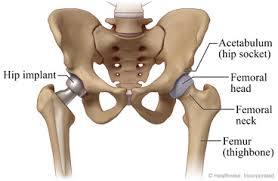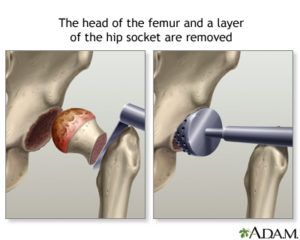TOTAL HIP REPLACEMENT: PROS & CONS OF THE OPERATION:
On the whole, total hip replacement is seen as one of the most successful operations that medicine has to offer. In the right patient, it can be an effective, safe, and durable way to treat many of the problems that come with severe arthritis of the hip. Pain relief: This is the greatest benefit that the procedure has to offer and the main reason for surgery.
A hip replacement can provide a dramatic reduction in pain, with almost all patients getting complete or near complete relief from arthritic hip pain. Improved mobility and hip function: After reduction in pain, increased mobility is the next major benefit.
A hip replacement should allow you get back walking without restriction. Improved hip function should also help significantly with other common problems associated with hip arthritis, such as climbing stairs, putting on socks, getting out of chairs, etc.
Long lasting: A hip replacement is a durable way to treat the problems that come with severe hip arthritis. Current evidence shows that 80-85% of hip replacements are still working at 20 years after they were inserted.
Know the RISKS AND COMPLICATIONS, before surgery day so you know what can happen and what to keep an eye out for after surgery:
While overall it is deemed to be a safe procedure, there are associated risks that potential patients need to be made aware of.
1-Infection: A small number of people (around 1%) can get an infection around their hip replacement. This can be one of the most debilitating complications associated with total hip replacements, as it can require several further surgeries and prolonged courses of antibiotics to treat the infection.
2-Blood clots: For a period after the operation, people who have a hip replacement are at an increased risk of developing blood clots in the veins in their leg and pelvis. These can be dangerous because pieces of the clot can break off and travel to the lungs. You may be prescribed blood thinners for a period after the operation to help reduce the risk=prevention. Other measures such as compression stockings, and calf pump exercises may also be advised as a prevention of clotting in the lower extremities.
3-Bleeding/Blood loss: Significant blood loss can occur during the operation, and in the immediate period after. In the event that this happens, a blood transfusion may be required.
4-Dislocation: This occurs when the ball of the hip becomes dislodged from the socket. Dislocation occurs in less than 2% of patients. In most cases the hip can be put back into the socket while the patient is under sedation. In cases where the hip keeps dislocating, further surgery to stabilise the hip may be necessary. To reduce the risk of dislocation some patients are given instructions on certain positions to avoid. The specifics of these instructions depend on how your surgery was performed, and therefore should be discussed with your consultant.
5-Change in leg length: It can occur that after surgery one leg may feel longer or shorter than the other. While your consultant will make every effort to make leg lengths equal, slight differences may occur as a result of trying to maximize the stability of the hip. In cases where there is a significant difference in leg length, some people find that wearing a raised insole is helpful.
6-Nerve injuries They can cause weakness and numbness, which are generally temporary, but infrequently it can be permanent.
7-Loosening and wear: Over time, a hip replacement can begin to wear or loosen. This is the most common long-term problem associated with total hip replacements, and when severe, can cause significant hip pain. In such cases a second hip replacement surgery may be required. The rate at which wear and loosening occurs varies, however it usually only occurs many years after surgery. This can lead into:
Need for revision or additional hip surgery
Other complications: During the operation, injury can occur like a fracture to either the femur or the pelvis can occur. Most of these injuries can be treated during the operation but can affect rehab.
You may have other risks depending on your specific health condition.
Finally, while they are very rare, there are life threatening complications like heart attack, stroke, and kidney failure associated with getting a hip replacement and all other invasive surgeries like this. While these can happen without surgery, the stress of the surgery can put you at increased risk during the post-operative period.
The risk of these life threatening complications is very much associated with the general health of the patient PRIOR to the surgery.
**Discuss any concerns with your healthcare provider before the surgery.
Things to consider BEFORE getting hip surgery:
Thanks to the wonders of modern science and medicine, people are living longer than they used to in the past. While this is good news for most individuals, one of the flip sides of the long life coin is that individuals’ joints can’t always withstand all those extra years of use. Total hip replacements have become one of the most common surgeries for individuals over forty-five years of age. Even though these total hip replacements can offer the opportunity for many more years of pain-free active living, there are a number of things to take into consideration before undergoing a hip replacement.
The most common cause of hip joint deterioration is osteoarthritis; other possible causes include inflammatory arthritis (eg, rheumatoid or psoriatic arthritis), hip disorders of infancy and childhood, osteonecrosis (avascular necrosis), and trauma.
Before anything the patient should know their medical history including what treatments they are doing presently (including medications) for diseases or illnesses they may have. Then finding out how they maybe effected with going under this invasive surgery. You don’t have any idea? That’s what a good M.D. or surgeon will provide you with before your final answer to the M.D. in having hip surgery. If its yes than know this…
Recovering from a total hip replacement is a long and grueling process involving physical therapy, bed rest, and medications. Many individuals who undergo total hip replacement are surprised at the length of the recovery period and just how difficult it is to get back up and walking again. Hip replacements involve cutting through muscle and bone in some of the most tissue-dense areas of the body, creating possible serious wounds that take a good deal of time to heal.
Quick fixes have become more and more popular in today’s fast-paced society, but just because a solution is easy to come by doesn’t make it the most practical one. Even though hip replacements can offer long-term relief for arthritis and other hip issues, they shouldn’t be viewed as the only solution to hip issues.
Sometimes, lifestyle changes can offer the same level of relief that a total hip replacement can – and without the risky surgery. Losing weight, increasing one’s level of physical activity, and even moving to warmer climates can sometimes relieve hip pain.
Anesthesia is not easy on the body. Being put under for surgery is a little like being put into a controlled state of near-death. On top of that, hospitals have become notoriously plagued by antibiotic resistant bacteria. Going under the knife for any reason involves facing a long series of risks that include life-threatening infections, paralysis, or even death. Individuals should consult with their doctor about the many risks involved before undergoing any major surgery.
The goal of hip replacement surgery is to replace the parts of the hip joint that have been damaged. It also helps relieve hip pain that can’t be controlled by other treatments.
If other medical treatments don’t control your arthritis pain, your healthcare provider may recommend a hip replacement. Some medical treatments for degenerative joint disease may include: Anti-inflammatory medicines Glucosamine and chondroitin sulfate, pain medicines, limiting activities that are painful, assistive devices for walking such as a cane, physical therapy.
Your healthcare provider may have other reasons to recommend a hip replacement surgery.
How to be prepped for Hip Surgery long before the day of surgery:
1-Ask any questions that you might have about the procedure.
2-Sign a consent for the procedure.
3-Obtain a complete health history by your M.D. that is including medications you are on.
4-Your healthcare provider, you may have blood tests or other diagnostic tests prior to the procedure making sure the pt is a safe candidate for surgery and for the M.D. to know what they are up against.
5-You may need to stop taking certain medicines before the surgery. (Ex. Blood thinners like Aspirin or Coumadin or Lovenox). Usually the day before, for most.
6-You may meet with a physical therapist before your surgery to talk about rehabilitation (usually its after).
7-If your a smoker, stop before your surgery if not quit (the best choice). Smoking can delay wound healing and slow down the recovery period (overall affects your health).
8–Lose weight if you need to.
9-Also do conditioning exercises as prescribed to strengthen muscles.
10-Arrange for someone to help around the house for a week or two after you are discharged from the hospital or as long as the individual patient needs to be SAFE alone or for hours.
11-Highly likely, based on your health condition, your healthcare provider may order other specific tests or exams.

